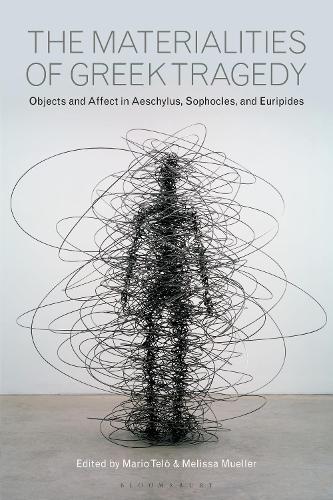
The Materialities of Greek Tragedy: Objects and Affect in Aeschylus, Sophocles, and Euripides
(Hardback)
Available Formats
Publishing Details
The Materialities of Greek Tragedy: Objects and Affect in Aeschylus, Sophocles, and Euripides
By (Author) Professor Mario Tel
Edited by Professor Melissa Mueller
Bloomsbury Publishing PLC
Bloomsbury Academic
14th June 2018
United Kingdom
Classifications
Tertiary Education
Non Fiction
Literary studies: ancient, classical and medieval
Ancient history
882.0109
Physical Properties
Hardback
320
Width 156mm, Height 234mm
621g
Description
Situated within contemporary posthumanism, this volume offers theoretical and practical approaches to materiality in Greek tragedy. Established and emerging scholars explore how works of the three major Greek tragedians problematize objects and affect, providing fresh readings of some of the masterpieces of Aeschylus, Sophocles, and Euripides. The so-called new materialisms have complemented the study of objects as signifiers or symbols with an interest in their agency and vitality, their sensuous force and psychosomatic impactand conversely their resistance and irreducible aloofness. At the same time, emotion has been recast as material affect, an intense flow of energies between bodies, animate and inanimate. Powerfully contributing to the current critical debate on materiality, the essays collected here destabilize established interpretations, suggesting alternative approaches and pointing toward a newly robust sense of the physicality of Greek tragedy.
Reviews
This is an enormously engaging book, full of subtle and imaginative treatments of tragedy What it offers most clearly is a taste of the great variety of modern materialisms and also a sharp sense of what these movements disavow: explorations of the soul, the spirit, transcendence, language as a transparent or logical system, transparency or logic, human agency, consciousness, intentionality, or authorship. Engaging with the volume is an extraordinarily useful way to understand the many potentials, and the constraints, of this varied set of intellectual movements. I can well imagine teaching with these essays, if only to prod my students to excitement, irritation, and ideas. * Bryn Mawr Classical Review *
This valuable collection almost without exception succeeds brilliantly in exemplifying the exhilarating range of potential in critical applications of the new materialisms to Athenian tragedy. At the same time, it does not shy away from some frank expressions of discomfort with the ethical risks inherent in the idea of matter as almost subjectively vibrant or in the notion of the destabilising in-between-ness of affect, theorising that could seem to justify the alleviation of human responsibility for our material and social environment. * The Classical Review *
This collected edition is at the cutting edge of theoretical engagements with Athenian tragic drama, and showcases world leading scholars teasing out the implications of the tragedians obsession with objects and their connections to emotional experience. * Classics for All *
The studies contained in this volume show that the remit of new materialism is broad and generous, that it can be mobilised in all sorts of ways. * Hermathena *
This valuable collection almost without exception succeeds brilliantly in exemplifying the exhilarating range of potential in critical applications of the new materialisms to Athenian tragedy. At the same time, it does not shy away from some frank expressions of discomfort with the ethical risks inherent in the idea of matter as almost subjectively vibrant or in the notion of the destabilising in-between-ness of affect, theorising that could seem to justify the alleviation of human responsibility for our material and social environment. These readings of the Greek tragedies own complex engagement with matter and affect further suggest that some of the new materialisms are not entirely as new as they may seem. * The Classical Association *
Author Bio
Mario Tel is Professor of Classics at University of California, Berkeley, USA. He is author of Aristophanes and the Cloak of Comedy: Affect, Aesthetics, and the Canon (2016) and an edition and commentary of Eupolis's Demes (2007). Melissa Mueller is Associate Professor of Classics at the University of Massachusetts Amherst, USA. She is author of Objects as Actors: Props and the Poetics of Performance in Greek Tragedy (2016).
